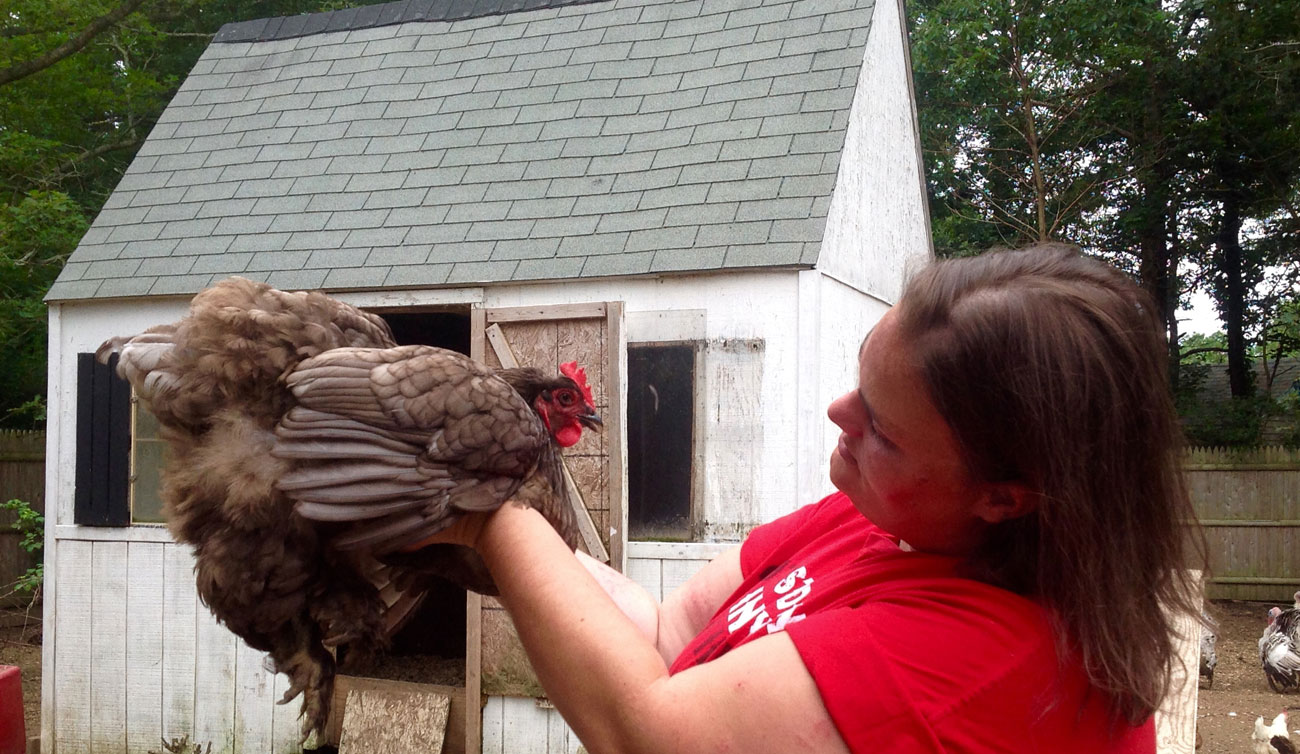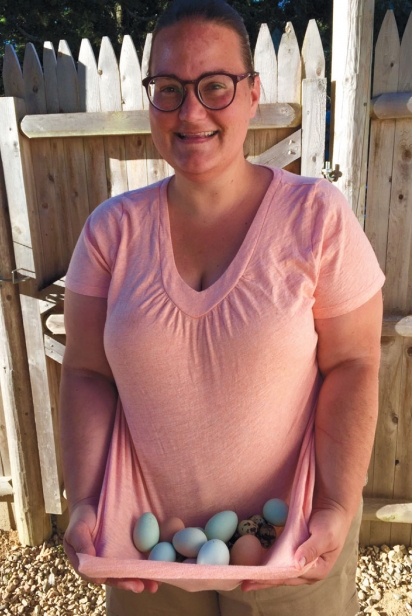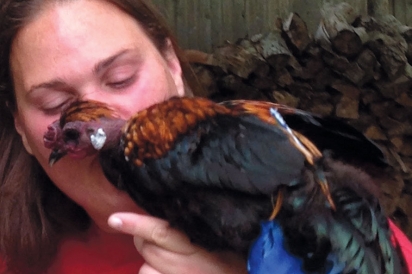Fine Feathered Friends
Enter Katie and Todd Richardson’s front door and find a roomy cage atop a sturdy wood stand. Six birds the size of chickadees, but pale colored, quietly explore. The smallest of the quail species, these are known as Buttonquail. So sensitive to the summer sun and winter cold they require air conditioning or heat to survive the Cape’s climate. “We were gifted three,” explains Katie. “Now we’re up to two males and four females.”
Three to four ounces each, these birds taste like chicken, but are mostly feathers. Tipping the scales at six grams, their eggs, considered a delicacy by many, are the size of small acorns minus their caps. Chefs hard-boil, soft-boil or pickle them. Katie demos a minuscule serving tool that grasps the petite eggs for slicing. Beneath this quail habitat in a cage on the floor are Mr. and Mrs. Parakeet, quiet for now. “I’m bird-sitting,” she says. “I just can’t say no.”
From the far side of the room, a diminutive, black-feathered, exotic-looking chicken steps towards me, then halts in its tracks. It’s wearing a red gingham diaper? Before I can ask, Katie laughs, “I make them myself.”
Finally over her stage fright, this chicken crosses the wood floor to a rainbow-colored xylophone keyboard. Does she play? Katie says, “Not yet.” All this before even a step into the Fluffy Butt farmyard.
Solo today, Katie is without husband Todd, who is away on a West Coast assignment. An Air Force Staff Sergeant of the 6th SWS, or Space Warning Squadron, Todd is a missile warning and space surveillance specialist, monitoring global rockets and missiles of concern for the US and its protectorates, as well as satellites in space. Katie begins the tale of their life as a military family with a side gig raising chickens. Only it’s not just chickens. It’s two breeds of quail, ducks and turkeys, too. At least so far. “I didn’t grow up raising birds,” says Katie, “but along the way they found me.”
When she was growing up, Katie’s dad built power plants, which meant the family moved around a lot. “My siblings and I would get used to a place and make friends, but then dad would finish, and we’d be off. I learned quickly that I love animals. We didn’t have many pets growing up, but we always had a dog, sometime guinea pigs or a rabbit,” says Katie. “Animals don’t care, they treat you the same, and you don’t have to learn a special language for them. They just like you.”
Her grandparents had a farm in Arkansas where the family visited in summer. “I always loved it there, that giant pasture with cows, pigs, ducks, chickens, turkeys and a horse,” says Katie. “My grandpa was a hunter and he taught me about guns and how to slaughter a duck, too.”
After college, Katie worked as an ambulance medic in Tennessee, Arkansas and Missouri, with hopes of attending medical school. Matched with her eventual husband through friends, they began their Texas-Colorado romance online. Finally getting to spend a week together clinched the deal. “It’s great way to start a relationship,” says Katie. “Online you have to talk, and you learn a lot about each other before you even meet.”
A second chicken, this one in the kitchen, is crowing as loudly as it can. “Oh, Colt,” Katie calls to the bird, then says to me, “He was raised totally indoors, so that is his dog bark. He crows when the phone rings, when he’s excited, when the doorbell buzzes.” “Colt, short for Colton?” “Nope, he’s named after the Colt Peacemaker,” says Katie.
She explains that the Colt Peacemaker is a well-known gun in the South, and until 1892, the revolver of the US Military. While working as a medic, she had difficulty with her legs and was unable to find relief. After two years of misdiagnosis, her spine was implicated as the cause. “I ended up having seven back surgeries in eight years, and lots of rehab. Colt was one of the ways I got through it,” says Katie. “He’s my Peacemaker.”
Living then with Todd on a base in California, Katie worked when she could as a pastry chef making specialty desserts. She said yes to someone wanting a cake who offered a trade of four just-hatched chicks. Later when she was unable to walk, a visiting nurse noticed that Katie grew calmer when she brought one of those chickens inside for her to hold. She urged Katie to find a breed that she could raise inside and get herself a chick.
Katie researched, selecting the Showgirl breed (even the males like Colt are called Showgirls) and located a source a few hours away. Explaining that it would be a comfort animal, the breeder gave her one no charge. She raised Colt totally indoors. Soon he was eating grapes out of her palm. Katie needed him more than ever when it was later discovered by a specialist in Boston that she also had extremely low blood pressure, orthostatic hypotension, a rarity affecting only 200,000 people globally.
She had very low days, but with Todd’s support, and the companionship of Colt, her pain diminished. Two and half years ago, they moved again, this time to Cape Cod. “We were thrilled to be able to find this home in a town that would support a small poultry farm.”
Immediately after their property closed, Katie looked for opportunities to connect with her new community and make friends. A notice seeking volunteers for a new food pantry opening on the military base spoke to her.
“At the pantry we start early, prepping and cooking for our twice-monthly pickup hours of 3-5 pm. There are tables of fresh vegetables, fruit and canned and dry goods like peanut butter, cereal and pasta. A cooked family-style meal is available each week to go. We might have shepherd’s pie, turkey chili, or fresh fish,” Katie says. “Our policy is that not just military members, but anyone with base access, like civilians and veterans, are welcome to participate.”
“I learned throughout my recovery the importance of a healthy diet and managing my electrolyte levels. I want to pass on that nutritional knowledge to others. Most people also don’t realize that military salaries are modest. If we can lower a family’s food budget, some of those savings can be channeled to other needs like a kid’s music lessons or hockey skates,” says Katie. “Plus, if I’m having a bad day, they accept my liabilities and work around it. When we all come together, we can do something great for our communities. I really look forward to it. It’s good, especially after the loneliness of being homebound for several years with back problems,” says Katie.
Fluffy Butt’s feathered residents experience her commitment first hand everyday. They roam free, living outdoors amongst the trees and the sun and the snow. The buffet is always open with plenty of fresh vegetables Katie collects daily from local stores. On this warm day a slew of split watermelons are prepped and ready for snack time. Katie says, “We just let them be birds and be happy.”
Recalling a run-in years earlier with an Indian Runner duck, I shadow Katie, ducking behind her to tour Fluffy Butt Farm. One hundred fifty birds. ONE HUNDRED FIFTY! I step outside silently chanting, “I think I can, I think I can.”
Only two creatures charge us, sniff me over and run off. These are the Richardsons’ only un-feathered pets just doing their jobs. “That’s Jade and Echo,” calls Katie. “Australian sheep dogs we rescued to protect our birds.”
With tail feathers extended, the largest of the Royal Palm turkeys rumbles over. Luminous light blue skin ripples around his beak. Up that close his dagger-looking toes have me on alert. “He’s the head male checking you out,” says Katie.
Three younger smaller males—his sons—lead a bevy of twenty chickens of mixed varieties. “This is more male turkeys than we actually need, but we keep them around to protect our girls from the raccoons and rats,” says Katie.
With their home located on a pleasant residential street, Todd and Katie are courteous about their neighbors, and have rimmed the perimeter of the farm with six-foot fencing. They also located their coops the farthest they could from anyone’s bedroom. Katie says, “Our roosters wear collars that humanely minimize their crowing, to keep them a bit quieter.”
Ten ducks, heads leaning forward and synchronized in step, zip past a ramped swimming pool towards some shade trees. Near the rear of the yard is a large coop the size of a single-car garage, its doors splayed open. In its dark shadows, I make out a few mamas huddled atop banana boxes. Nearby stands a more compact trio of coops. One houses a pair of Malaysian Serama chickens the Richardsons also rescued. Just one pound each, these, the smallest chickens in the world, require a screened-in home so the hawks don’t whisk them away.
Katie invites me into the walk-in quail pen, home to the larger Coturnix breed they can raise outdoors. About six feet by fourteen feet and topped with a mesh roof so the birds don’t fly off, the bottom was lined by Todd and Katie as a deterrent to tunneling predators. “We have forty-seven of these, half of them girls. We sell the eggs, but we also eat them,” says Katie.
Pointing to a lilac tree near the quail pen, Katie says, “Underneath it lays Biggy. We kept her frozen since January when she passed, until we could dig a hole in the spring. We wanted her nearby.”
Biggy, Katie explains, was the last chicken remaining from their California days, one of the four babies that launched their bird journey. “Being a California gal, she didn’t like New England winters. She was only producing about two eggs weekly by this time, but when she was ready to lay, she would vocalize and do her chicken growls non-stop until we let her in. It took her about an hour; she’d stay in a corner or go to our inside pen until she’d lay her egg, and then happily go back outside.”
Except for the first few eggs a bird lays, which are smaller than average and known as pullet eggs, an egg’s size is not affected by a bird’s age. Some varieties lay six to seven times a week and some only two to three. As hens mature, their laying diminishes. Katie and Todd collect eggs daily, searching as if on a mad Easter egg hunt. “You never know where they’ll be, but we’re onto some of their hiding spots by now,” says Katie. “You do need to peek underneath them. The hens often switch and sit on one another’s eggs.”
Mandated by state rules, every night finds Katie and Todd processing eggs, including candling (holding a lit candle in darkness near the egg reveals any imperfections), washing, sanitizing and sorting by size before refrigeration. “Actually, if the natural covering of an egg or its “bloom” is not removed, it’s stable at room temperature,” says Katie. “We sort them by type and size into seven different colors of cartons, selling by rotation so we know which were gathered first.
Usually our inventory moves in well under two weeks.”
Katie finds poultry education easy with books, classes and the Internet. She’s met a wonderful local vet and is now a New England Bantam Association member. At their semi-annual shows she’s an educator, sharing information and games like chicken bingo, with proceeds benefitting student scholarships to the Norfolk County Agricultural School in Walpole. Studying poultry genetics and working now to keep two specific heritage breeds in existence—the Cochin chicken and the Royal Palm turkey—Katie is in regular contact with several zoos.
Asked if she regrets leaving her former cake business, Katie cracks up, incredulous. “Have you ever worked with a bride and had a chance to mess up dessert on one of the most important days of her life?” She says, “I wanted to pull my eyeballs out.” Yet if not for that initial cake swap, Fluffy Butt Farm might never have hatched.
At local farmers’ markets, the pair sell dozens of all varieties of eggs and mixed samplers, served up with a complimentary dollop of poultry talk. Katie and Todd have an interactive display, with a farm photo book that he designed, display eggs, charts and whimsical peacock plumes.
Often called to duty with little notice, a few months’ deployment for Todd can sometimes stretch much longer. A recent stint in Greenland morphed into a yearlong stay. “Then it’s difficult to hold down this farm by myself,” says Katie. “It’s a challenge every day in that my energy level can run from fully functional to totally depleted. Sometimes it’s really hard, but you learn.”
“My whole journey to regain my health has been with these birds and I can do all of this now with my condition. We treat them right, and it makes me happy,” says Katie. “I never thought that all of this would open up such a big world.”
After four hours together the sun is near set, and the farm needs to be tucked in for the night. The moment I am leaving, Colt finally investigates me, strutting so near I can touch him. I notice a pale grey patch on the left side of his dark feathered head. “Look at that,” I gasp. “Just his ear lobe,” says Katie, grinning. In the perfect shape of a heart.
Fluffy Butt Farm
567-233-2621 / FluffyButtFarm@yahoo.com On Facebook and Instagram Harwich & Orleans Farmers’ Markets







